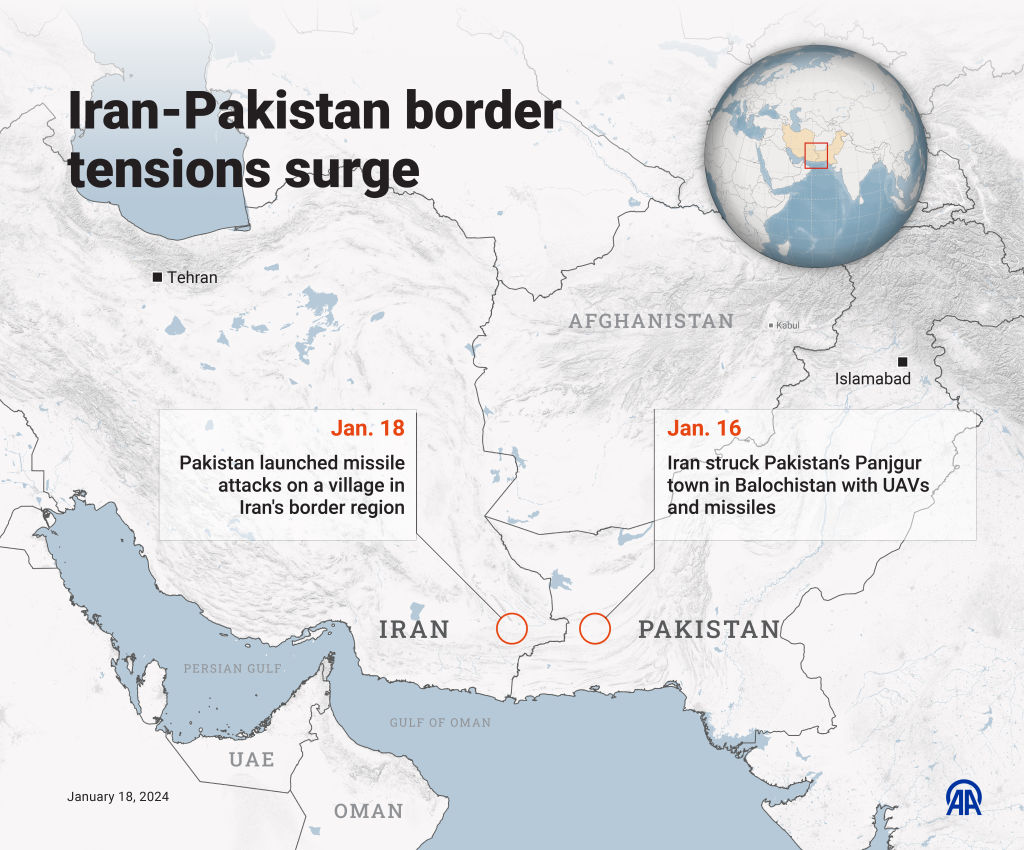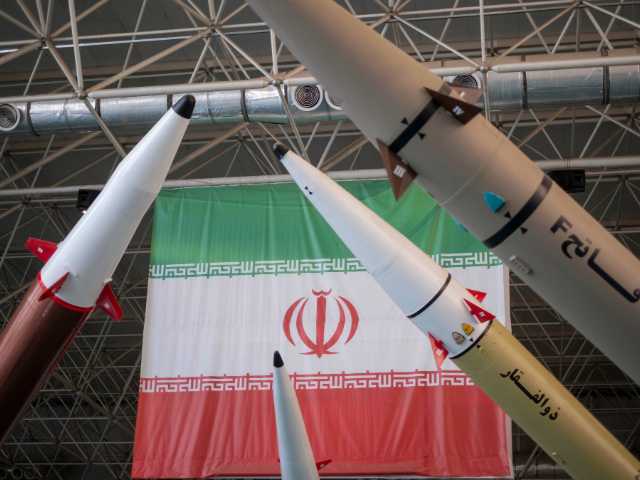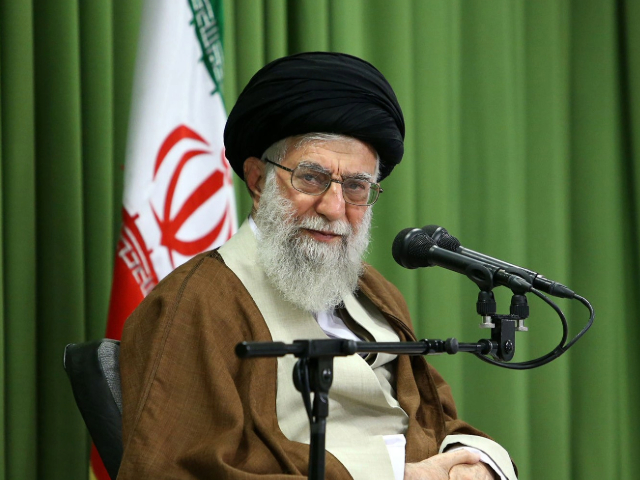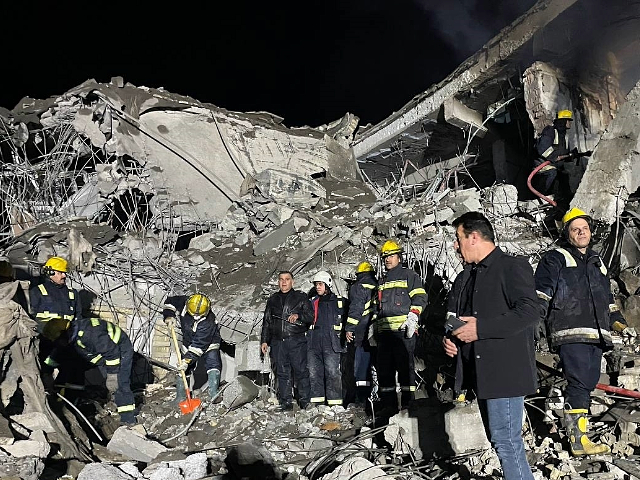The Taliban terrorist organization that rules Afghanistan urged its neighbors in Iran and Pakistan to show “restraint” after the two nations bombed each other, allegedly to diminish the threat of ethnic Baloch separatist groups to their respective governments.
The Iranian Islamist regime engaged in strikes within Pakistani territory on Tuesday, reportedly killing children and prompting Islamabad to withdraw its ambassador to Tehran and demand respect for its sovereignty. Two days later, the Pakistani military bombed the Iranian province of Sistan and Baluchestan, which it borders, for allegedly the same reason.

An infographic titled ‘Iran-Pakistan border tensions surge’ created in Ankara, Turkey on January 18, 2024. (Elmurod Usubaliev/Anadolu via Getty Images)
The exchanges of aggression caused international concern in the broader context of Iran’s dramatic expansion of terrorist activities during the tenure of American President Joe Biden, which most recently included the bombing of a residence in Erbil, Iraqi Kurdistan, and some sporadic airstrikes in Syria. Pakistan is one of the world’s few established nuclear weapons powers, while Iran has been illegally pursuing nuclear weapons for decades. The International Atomic Energy Agency (IAEA) warned in November that Iran appeared to be enriching uranium at a rate far beyond what is necessary for peaceful nuclear development and again complained this week that the regime was not allowing its inspectors to do their jobs properly.

Iranian surface-to-surface missiles are pictured in front of an Iran flag at the Islamic Revolutionary Guard Corps (IRGC) National Aerospace Park in western Tehran, October 11, 2023. (Morteza Nikoubazl/NurPhoto via Getty Images)
Abdul Qahar Balkhi, a spokesman for the Taliban’s “foreign ministry,” responded to the exchange of fire across the Iranian-Pakistani border by declaring the Sunni terrorist organization is “alarmed.” The terror organization, which waged a two-decade insurgency against the U.S.-backed government of Afghanistan before overthrowing it under Biden in 2021, called “on the two neighboring countries to exercise restraint.”
The Ministry of Foreign Affairs of the Islamic Emirate of Afghanistan considers the recent violence between the Islamic Republic of Iran and the Islamic Republic of Pakistan alarming, and calls on the two neighboring countries to exercise restraint. pic.twitter.com/NlOQMRSn4i
— Abdul Qahar Balkhi (@QaharBalkhi) January 18, 2024
Balkhi added that, thanks to the Taliban’s conquest of Kabul, the region was allegedly enjoying “newfound peace and stability” and “both sides should direct efforts towards further strengthening regional stability and resolving disputes through diplomatic channels and dialogue.”
Iran claimed the strikes in Pakistan on Tuesday were necessary to subdue the threat from Jaish al-Adl, a Baloch separatist group seeking to carve out a country for the ethnic group out of parts of both Pakistan and Iran.

Iran’s Supreme Leader Ayatollah Ali Khamanei. (Iranian Leader’s Press Office – Handout/Anadolu Agency/Getty Images)
“We respect the sovereignty and territorial integrity of Pakistan and Iraq, but we do not allow our national security to be compromised, and we have no compunction about [dealing with] terrorist parties inside Pakistan and Israeli movements in the Kurdistan region of Iraq,” Iranian Foreign Minister Hossein Amir-Abdollahian said. “What we did was aimed at boosting the security of Iran, Pakistan, Iraq, and the region. We consider the security of Iraq and Pakistan to be that of the Islamic Republic of Iran.”
The Iranian government claimed its bombing of Iraqi Kurdistan was intended to neutralize “Mossad bases.” In reality, no evidence exists of Mossad bases within the Kurdistan Regional Government (KRG) territory and the Iranian strikes killed a prominent businessman and his infant daughter, who would have turned one year old ten days after the bombing.

Teams carry out search and rescue operations after unmanned aerial vehicle (UAV) attacks in Erbil, Iraq on January 16, 2024. Several explosions were reported in the vicinity of the U.S. consulate in Erbil, with Iran’s Islamic Revolutionary Guard Corps (IRGC) quickly claiming responsibility, saying it was targeting a ‘spy headquarters’ and a ‘gathering of anti-Iran terrorist groups’ in the region with ballistic missiles. (Karzan Mohammad Othman/Anadolu via Getty Images)
While Islamabad considers the group a threat to its own national security, it responded to the bombings with fury, accusing Iran of killing two girls and wantonly violating the nation’s sovereignty.
“Pakistan strongly condemns the unprovoked violation of its airspace by Iran and the strike inside Pakistani territory which resulted in the death of two innocent children while injuring three girls,” the Pakistani government declared. “This violation of Pakistan’s sovereignty is completely unacceptable and can have serious consequences.”
Pakistani leaders withdrew their ambassador from Tehran and expelled the Iranian ambassador from Pakistan. It ominously added that it “reserves the right to respond.”
On Thursday, the Pakistani military apparently responded with what appeared to be a nearly identical military action within Iranian territory. The Pakistani bombings allegedly targeted two other Baloch separatist groups: the Balochistan Liberation Army (BLA) and the Balochistan Liberation Front (BLF), which Iran also recognizes as terrorists.
RELATED VIDEO — CNBC: We Aren’t Really Enforcing Iran Oil Sanctions, “De Facto Policy” “to Let Every Iranian Barrel on the Market”:
“The precision strikes were carried out using killer drones, rockets, loitering munitions and stand-off weapons. Maximum care was taken to avoid collateral damage,” the Pakistani military claimed.
The Iranian government accused Pakistan of killing four children, among nine victims, and issued a statement condemning the violation of the country’s sovereignty.
The Taliban’s diplomatic relationship with both Iran and Pakistan, with which Afghanistan shares borders, remains frayed since the conquest of Kabul. The Taliban does not enjoy formal recognition as a government entity from any country, though it maintains formal diplomatic ties as an “interim” regime with some of its neighbors, most prominently China and Iran. Attempts to establish peaceful ties between Tehran and the Taliban have been frayed by disputes over water rights along the Helmand River, which the two countries share. Iran accused the Taliban of hoarding water supplies for much of 2023, to which the Taliban responded that the region was experiencing a severe drought and Afghans did not have any water to share. The dispute resulted in a minor shootout on the border in May between Iranian and Taliban border forces, resulting in two dead Iranian guards and one Taliban jihadist.
The Taliban’s relationship with Pakistan soured towards the end of 2023 when Islamabad announced the mass deportation of nearly 2 million Afghan nationals on its territory. The Afghans were told to leave voluntarily by November 1 or face deportations, which began the next day.
“The behavior of Pakistan towards Afghan refugees is unacceptable,” said Taliban spokesman Zabihullah Mujahid at the time. “The Pakistani side should reconsider its plan. Afghan refugees are not involved in Pakistan’s security problems. As long as they leave Pakistan voluntarily, that country should tolerate them.”
Pakistan has continued its deportations, aiming for the deportation of 10,000 people a day.

COMMENTS
Please let us know if you're having issues with commenting.